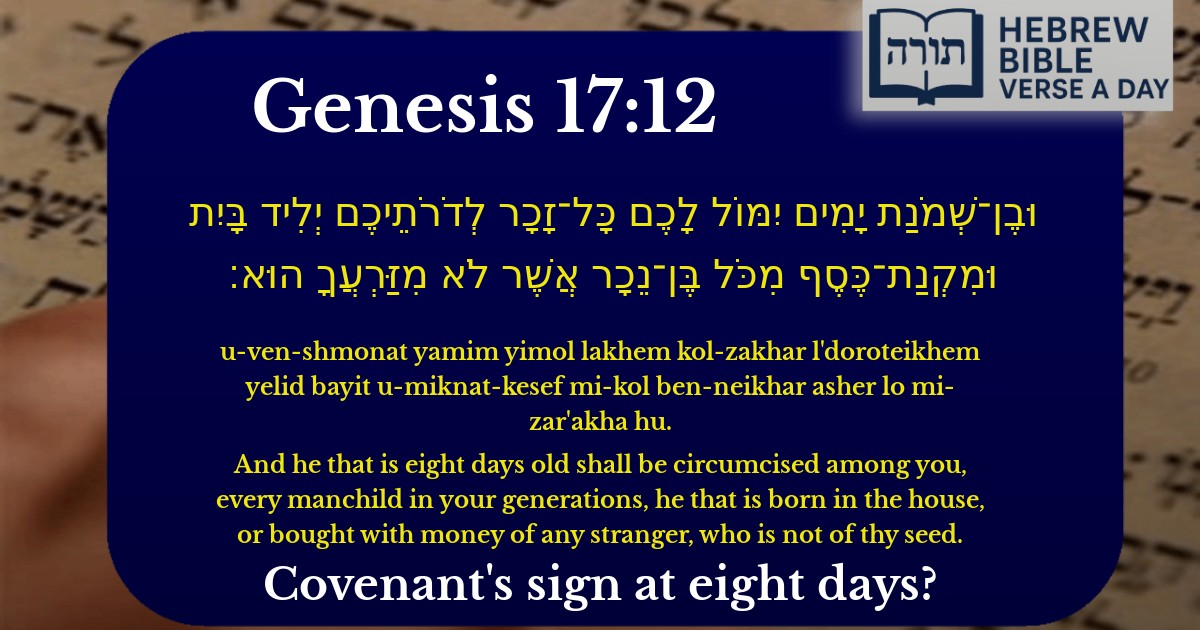Join Our Newsletter To Be Informed When New Videos Are Posted
Join the thousands of fellow Studends who rely on our videos to learn how to read the bible in Hebrew for free!
Hebrew Text
וּבֶן־שְׁמֹנַת יָמִים יִמּוֹל לָכֶם כָּל־זָכָר לְדֹרֹתֵיכֶם יְלִיד בָּיִת וּמִקְנַת־כֶּסֶף מִכֹּל בֶּן־נֵכָר אֲשֶׁר לֹא מִזַּרְעֲךָ הוּא׃
English Translation
And he that is eight days old shall be circumcised among you, every manchild in your generations, he that is born in the house, or bought with money of any stranger, who is not of thy seed.
Transliteration
U-ven-shmonat yamim yimol lakhem kol-zakhar l'doroteikhem yelid bayit u-miknat-kesef mi-kol ben-neikhar asher lo mi-zar'akha hu.
Hebrew Leining Text
וּבֶן־שְׁמֹנַ֣ת יָמִ֗ים יִמּ֥וֹל לָכֶ֛ם כׇּל־זָכָ֖ר לְדֹרֹתֵיכֶ֑ם יְלִ֣יד בָּ֔יִת וּמִקְנַת־כֶּ֙סֶף֙ מִכֹּ֣ל בֶּן־נֵכָ֔ר אֲשֶׁ֛ר לֹ֥א מִֽזַּרְעֲךָ֖ הֽוּא׃
וּבֶן־שְׁמֹנַ֣ת יָמִ֗ים יִמּ֥וֹל לָכֶ֛ם כׇּל־זָכָ֖ר לְדֹרֹתֵיכֶ֑ם יְלִ֣יד בָּ֔יִת וּמִקְנַת־כֶּ֙סֶף֙ מִכֹּ֣ל בֶּן־נֵכָ֔ר אֲשֶׁ֛ר לֹ֥א מִֽזַּרְעֲךָ֖ הֽוּא׃
🎵 Listen to leining
Parasha Commentary
📚 Talmud Citations
This verse is quoted in the Talmud.
📖 Shabbat 132a
The verse is cited in a discussion about the proper time for circumcision, emphasizing that it should be performed on the eighth day.
📖 Yevamot 71b
The verse is referenced in a discussion about the inclusion of converts and slaves in the commandment of circumcision.
📖 Pesachim 96a
The verse is mentioned in the context of discussing the laws of circumcision and its applicability to all male descendants.


The Mitzvah of Milah on the Eighth Day
The verse (Bereishit 17:12) establishes the commandment of brit milah (circumcision) for male infants on the eighth day after birth. Rashi explains that the Torah specifies the eighth day to teach that even if the child is born on Shabbat, the brit milah overrides Shabbat restrictions, as it must be performed precisely on the eighth day. The Rambam (Hilchot Milah 1:18) further clarifies that this timing is optimal for the child's health, as the infant gains sufficient strength by this day.
Inclusion of All Male Members of the Household
The verse extends the obligation to three categories of males:
Perpetual Covenant for All Generations
The phrase l'doroteichem (for your generations) emphasizes the eternal nature of this commandment. The Sforno notes that this mitzvah applies in all circumstances - whether the Jewish people reside in their land or in exile. The Midrash (Bereishit Rabbah 46:9) connects this to the promise that the Jewish people will endure forever, with brit milah serving as an everlasting sign of our unique relationship with Hashem.
Spiritual Significance of the Eighth Day
The Kli Yakar offers a profound insight: the number seven represents the natural order (e.g., seven days of creation), while eight symbolizes transcendence of nature. Circumcision on the eighth day demonstrates that the Jewish people are elevated above mere natural existence through their covenant with the Divine. This aligns with the Zohar's teaching that brit milah completes the human form, bringing the child into full spiritual potential.